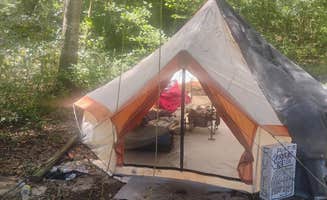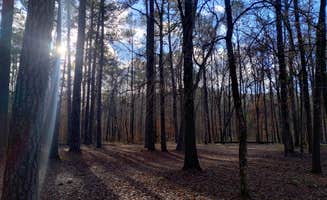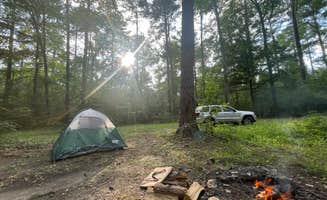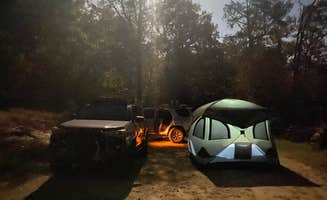Dispersed camping near Griffin, Georgia consists primarily of backcountry sites located within state-managed Wildlife Management Areas. These primitive camping locations typically require a Georgia Lands Pass or valid hunting/fishing license for access. Most sites sit at elevations between 700-900 feet, with hot humid summers and mild winters that extend the camping season year-round. Roads leading to these sites often become muddy during Georgia's frequent rainfall periods.
What to do
Waterfall exploration: Murder Creek Parking Area provides access to natural cascades just a short walk from camp. "Had fun walking down to the water. I suspect in the summer this area is quite the hot spot with swimmers," notes camper Steve S., who enjoyed the sound of falling water drowning out distant traffic noise.
Wildlife observation: Rum Creek WMA attracts nature enthusiasts with opportunities to spot native species in their natural habitat. The area offers a genuine backcountry experience where visitors can practice wildlife photography or quiet observation. Brian K. describes it as "nice and quiet" and "perfect for tent camping."
Trail hiking: Ocmulgee River Camp features horse trails that double as hiking routes through forested terrain. "Beautiful campsite... saw some deer on a walk. It was quite hot but surprisingly not that buggy," reports Julie H., highlighting the wildlife viewing opportunities along these paths.
What campers like
Dark skies: Campers appreciate the minimal light pollution at many Griffin-area dispersed sites. LeeAnne T. describes Tyler Hunt Camp as "quiet, super dark at night and beautiful," making it ideal for stargazing enthusiasts wanting to experience Georgia's night sky without urban glow.
Winter camping opportunities: The region's mild climate extends camping season well into winter months. At Ocmulgee River Camp, Greg D. noted it was "very quiet this time of the year (January)," while another camper reported, "It was nice and warm even in December! Almost 70 degrees!"
Spacious campsites: Most dispersed areas offer ample room between camping spots. J.A. appreciated that Ocmulgee River Camp had "2 neighbors" but a "great amount of space to find a nice spot," while SJ W. found "a nice horse trail to hike" near their campsite.
What you should know
License requirements: Most WMA camping requires documentation. At Rum Creek WMA, Brian K. advises visitors "must have a hunting or fishing license or a land use pass." Lonnie B. confirms this at Joe Kurz WMA, noting the "requirement for a valid Georgia hunting or fishing license to camp."
Road conditions: Access roads to dispersed sites vary considerably. Michael S. describes Ocmulgee River Camp as "only a mile off the road, which is a little bumpy but manageable," while Steve S. warns that Murder Creek Parking Area "probably does require a little clearance. So, a sedan may not be the best choice."
Hunting seasons: Be aware of active hunting periods when visiting WMAs. Lonnie B. recommends checking before visiting Joe Kurz WMA, noting "visitors should also be aware of the active hunting seasons." At Ocmulgee River Camp, Julie H. mentioned, "There are hunters around and we heard a good deal of shots."
Tips for camping with families
Safety considerations: When camping with children at Tyler Hunt Camp, monitor evening activity patterns. While LeeAnne T. found it to be "a refuge" where "folks keep to themselves," Micah C. had a different experience, noting "vehicles coming and going" after dark that created an uncomfortable atmosphere.
Weather planning: Georgia's weather patterns affect camping comfort significantly. One camper at Ocmulgee River Camp mentioned "it was quite hot but surprisingly not that buggy," suggesting early spring or fall visits might provide more comfortable temperatures for family camping trips.
Water features: Choose sites near gentle water access for family activities. At Murder Creek, the water cascades are approximately "200 feet down" from the parking area camping spot, providing a natural play area during warmer months that's within walking distance.
Tips from RVers
Clearance requirements: Access roads to most dispersed camping areas require vehicles with adequate ground clearance. Lenear B. noted at Joe Kurz WMA that while the area hosts "mostly tent and car campers," they successfully visited "with a travel trailer," suggesting some RV access is possible with proper vehicle capabilities.
Limited amenities: Prepare for complete self-sufficiency when RV camping in these areas. All sites lack hookups, dump stations, and fresh water. As one camper at Ocmulgee River Camp summarized, "no amenities, you pack it in, you pack it out."
Cell service variability: Connectivity differs significantly between sites. While one visitor reported "Verizon works perfectly" at Ocmulgee River Camp, Lenear B. noted "no cell coverage" at Joe Kurz WMA, making communication and navigation planning essential for RV travelers.





